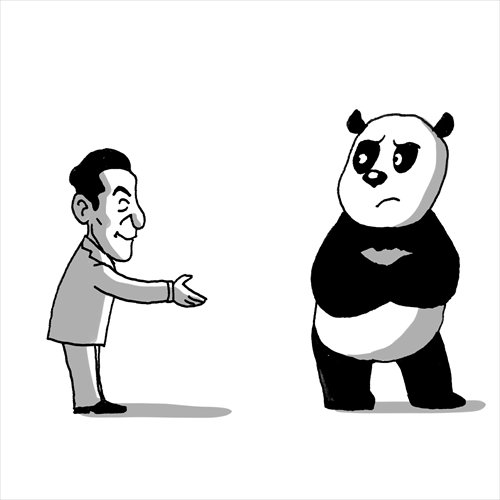 By Jin Ying (Global Times, China)
By Jin Ying (Global Times, China)
In an exclusive interview with Phoenix TV, Japanese Prime Minister Shinzo Abe made a rare elaboration of his views about Japan’s wartime atrocities, new security policy and the Sino-Japanese relations.
He said that in his August statement to commemorate the 70th anniversary of Japan’s defeat in WWII, he would include reflections and carry forward his predecessors’ understanding of historical issues, such as Tomiichi Murayama’s famous statement in 1995. He would make sure that Japan wouldn’t repeat the horrors of war and would revise the country’s national security policy along pacifist lines. He also looked forward to deepening Sino-Japanese relations for mutual benefits.
Due to his abrupt U-turn on these controversial issues, suspicions about Abe’s intension were soon raised. Taken at face value, Abe’s remarks are in accord with the trend of Sino-Japanese relations and conducive to the welfare and mutual interests of both sides.
Abe, a realist, knows clearly how the situation has evolved at present. He is aware of how much contribution Chinese tourists have made to Japan’s economy, and he also understands, no matter how hard he tries to deny, that the actions of the Japanese imperialist army in WWII have been stigmatized by the international community.
As the anniversary draws near, it seems that Japanese right-wing forces have little chance to overthrow the internationally recognized final conclusion on Japan’s atrocities during WWII. Abe, with no other choice, has to follow the trend.
But according to a poll conducted by Phoenix TV after broadcasting the interview, over 80 percent of Chinese respondents were suspicious of Abe’s honesty. Abe’s fickleness and unreliability has given him a notorious reputation among the Chinese.
After Abe took office in his first tenure as prime minister in 2006, he made an ice-breaking visit to China and won overwhelming approval from the Chinese public.
But after he regained power in 2012, he became an entirely different person in dealing with China, making every effort to plunge bilateral relations into a pit.
Recent years have seen Abe causing mounting problems on Sino-Japanese relations. Chinese society always keeps alert to some Japanese who are trying every means to deny Japan’s wartime atrocities and to dishonest Abe. It is indignation and vigilance that reminds the Chinese to be suspicious of Abe’s abrupt change of historical views.
The Japanese are also highly skeptical of their prime minister. In recent days, opposition to Abe’s new security policy has been raised by an increasing number of constitutional scholars and political figures.
Since he crossed the line in terms of constitutional revision and the new national security policy, Abe is facing the lowest approval rate since he retook office in 2012. It is possible that he is trying to win back popular support by showing kindness to China.
Although such kindness helps thaw the tensions between China and Japan, we still need to watch whether he will do as he has said. We are hoping Abe will deliver a historic and truly constructive speech on August 15.
The author is an associate research fellow at the Institute of Japanese Studies, Chinese Academy of Social Sciences. [email protected]

